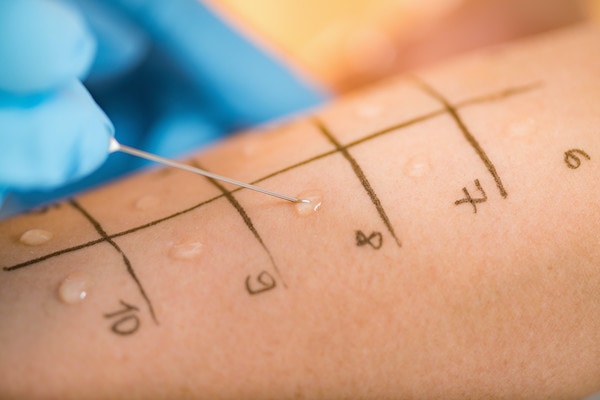EN 16412 Detection of Lupin Allergens in Food Products
The European standard EN 16412 specifies the methods for detecting lupin allergens in food products, ensuring compliance with EU legislation. This is a critical service for manufacturers and suppliers who must adhere to strict regulations regarding allergen labeling and safety.
Lupin (Lupinus albus), commonly known as broad bean or false lupin, has been increasingly used in various food products including breads, cereals, and protein supplements. While lupin is generally safe for most people, it contains a number of proteins that can cause severe allergic reactions in some individuals, particularly those with existing peanut allergies.
The European Union has implemented strict labeling requirements to inform consumers of potential allergens. The standard EN 16412 provides protocols and methodologies for the reliable detection of lupin allergens in food products. This ensures that manufacturers can accurately identify and report the presence of these proteins, thereby safeguarding public health.
The procedure outlined in EN 16412 involves several critical steps including sample preparation, extraction methods, and analytical techniques such as immunoassays or mass spectrometry. The standard emphasizes the importance of accurate quantification to ensure that food products meet regulatory thresholds for safety.
Our laboratory adheres strictly to these guidelines, providing reliable and compliant testing results. Our team of experts ensures that every test is conducted with precision and thoroughness, delivering consistent and accurate results that are essential for compliance and consumer trust.
- Sample Preparation: Proper handling and preparation of food samples before analysis.
- Extraction Methods: Techniques used to release lupin proteins from the sample matrix.
- Analytical Techniques: Utilization of immunoassays or mass spectrometry for detection.
- Quantification: Ensuring accurate measurement of lupin allergens in food products.
The standard also covers the validation of methods and the establishment of acceptable limits, ensuring that only reliable and repeatable tests are conducted. Our laboratory is equipped with state-of-the-art instruments and trained personnel to meet these stringent requirements.
By leveraging EN 16412, our clients can rest assured that their products comply with EU regulations and provide a safe product for consumers. This service not only aids in meeting legal obligations but also enhances the reputation of brands by demonstrating commitment to consumer safety and health.
Why It Matters
Compliance with EN 16412 is crucial for several reasons. Firstly, it ensures that food products are safe for consumption, particularly for individuals who may be sensitive to lupin allergens. Secondly, compliance helps protect manufacturers from potential legal and financial risks associated with non-compliance. Lastly, adherence to this standard enhances consumer trust, which is vital in today’s competitive market.
Non-compliance can lead to significant consequences, including fines, product recalls, and damage to brand reputation. By partnering with our laboratory, clients can avoid these pitfalls by ensuring their products meet all necessary standards. Our team of experts provides guidance on best practices for sample preparation, method validation, and result interpretation, helping clients navigate the complexities of allergen testing.
Consumer trust is paramount in the food industry. A single recall or legal issue can have a cascading effect, leading to lost sales and damaged brand image. By ensuring compliance with EN 16412, manufacturers demonstrate their commitment to consumer safety and health, thereby fostering long-term relationships with customers.
The standard also supports the broader goal of food safety by promoting transparency in labeling and reducing the risk of accidental exposure to allergens. This is particularly important for individuals with severe allergies who rely on accurate product information to make informed decisions about their diet.
Applied Standards
The European standard EN 16412 provides a comprehensive framework for the detection of lupin allergens in food products. This includes detailed methodologies and acceptance criteria that ensure reliable and accurate testing results.
The standard specifies that the detection limit should be at least 0.5 mg/kg, ensuring that even trace amounts of lupin proteins are detected. It also outlines the use of validated immunoassay techniques, such as enzyme-linked immunosorbent assays (ELISA), for quantification purposes.
In addition to these analytical methods, EN 16412 emphasizes the importance of method validation, including recovery studies and inter-laboratory comparisons. These steps ensure that the testing protocols are robust and reproducible across different laboratories.
The standard also covers the handling of false positives and negatives, providing guidelines for quality control measures to minimize errors in detection. This includes regular calibration of instruments and training of laboratory staff to ensure consistent performance.
Use Cases and Application Examples
- Bakery Products: Detection of lupin proteins in bread, pastries, and cakes.
- Cereals: Identification of lupin allergens in breakfast cereals and snack bars.
- Pasta: Verification of the absence or presence of lupin protein traces in pasta products.
- Milk Alternatives: Ensuring that plant-based milk substitutes do not contain trace amounts of lupin proteins.
- Protein Supplements: Testing for lupin contamination in dietary supplements and powders.
In each case, the goal is to ensure that food products are safe for consumption by individuals who may be sensitive to lupin allergens. This service plays a crucial role in maintaining public health and safety while also supporting manufacturers in meeting regulatory requirements.
Our laboratory provides comprehensive testing services tailored to meet the needs of various sectors within the food industry, including bakery, cereals, pasta manufacturing, dairy alternatives, and dietary supplements.





